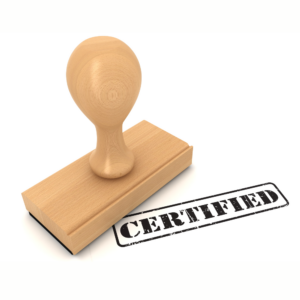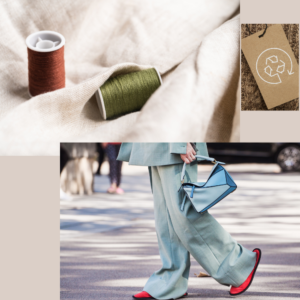
When you’re out and about clothes shopping and want to make more sustainable choices, it can be difficult to know what to look out for. What fabrics are the most environmentally friendly? What labels and certifications are there to show the brand is taking steps to be more sustainable?
There are actually quite a few certifications to keep an eye out for, not just when looking for clothes but also accessories like ladies’ umbrellas, shoes and bags. So, let’s look at some of the most common ones you may see and what they mean.

Global Organic Textiles Certification (GOTS)
GOTS is a voluntary processing standard that monitors and regulates all stages of the supply chain for businesses that want to process or trade GOTS textiles.
GOTS certifies organic fibres including cotton, wool, linen and hemp. As well as this, GOTS ensures that these products also meet strict social and environmental standards including safe working conditions, the use of low-impact chemicals only, and the proper treatment of wastewater.
When you’re looking for clothes, organic cotton is a good option. The manufacturing process uses no potentially harmful pesticides; therefore, the soils are healthier, less water is needed during production and local ecosystems are better protected.

B Corp
B Corp certified businesses (sometimes called B Corps) are businesses that meet high social, environmental and transparency standards. This can include ensuring that the business takes steps to protect natural ecosystems, alleviate poverty, and help communities thrive.
The B Corp movement is global, and in the UK, around 1,500 companies are B Corp certified. Many fashion brands, such as Patagonia, Wolf & Badger, Toms, and Allbirds, are also joining in and committing to better business practices.
If you want to have a go at renting clothes as a more sustainable way to stay fashionable, the popular apparel rental website HURR became a B Corp in 2022. As part of this, HURR sends its products in reusable packaging and cleans them with a sustainable dry-cleaning service.
Fairtrade
Most of us will recognise the Fairtrade symbol from the foods we buy in the supermarket, but you can also find the label on some cotton clothing. Clothes that carry the Fairtrade certification ensure that the cotton farmers are paid fairly and protect their health and safety.
The Fairtrade Textile Standard is one part of a wider programme to bring about widespread change to every stage of textile supply chains. This includes empowering workers, introducing better wages and conditions, and reducing environmental impact.
Bluesign
Based in Switzerland, Bluesign’s mission is to work with manufacturers at all stages of the supply chain to minimise environmental impact.
Clothes and other textile products carrying the Bluesign label must meet strict environmental standards, from the chemicals used to carbon emissions, water and energy usage, and worker safety.
Better Cotton Initiative (BCI)
BCI is a global initiative to improve cotton production and has over 2,500 members across the world. The Better Cotton Standard System is guided by principles, and the BCI works with farming communities to help them introduce better and more sustainable processes.
This includes regenerative farming practices that conserve and enhance the environment, phasing out the use of hazardous chemicals, creating fair and safe working conditions, and increasing the climate resilience of cotton farming communities.
Fair Wear
The Fair Wear Foundation is a non-profit organisation whose goal specifically focuses on improving the lives of garment workers, a vast majority of whom are women.
Fair Wear advocates for better labour standards. These include living wages, reasonable working hours, safe and healthy working conditions, legally binding employment and freedom from discrimination or harassment.
Currently, 107 brands have joined the Fair Wear movement.
OEKO-TEX
OEKO-TEX is an internationally recognised standard that ensures that textile products, including clothes as well as other items, are free from any harmful substances or chemicals. To become certified, the product must be submitted for independent testing, and every element (down to every zip and button) must meet the standard.
You might see up to seven different OEKO-TEX labels while shopping. For example, the ‘Standard 100’ label identifies that the product has been thoroughly tested from raw materials to the finished item. Meanwhile, the ‘Made in Green’ label ensures that textile and leather goods that have been made using sustainable practices are also free from any harmful substances.
Global Recycling Standard (GRS)
Another option you might have considered is fashion, which is made from recycled materials. For this, a good one to look out for is the Global Recycling Standard.
The GRS covers many production areas, including the requirement that the end product be made from at least 20% recycled material, that energy and water consumption be monitored, and that waste be handled responsibly.
The social criteria of the GRS also apply to labour practices during production. This covers wages, working conditions, overtime, health and safety and employee representation.

One important thing to remember is that some smaller brands may be unable to afford to be certified. In that case, a good thing to look out for is how transparent they are about their supply chains and their sustainability practices. It should be a core part of their business whether they have these labels or not.
Nevertheless, next time you’re looking for some new clothes or accessories – whether that’s online or out in the shops, don’t forget to check the labels as well and make your choices more responsible.
